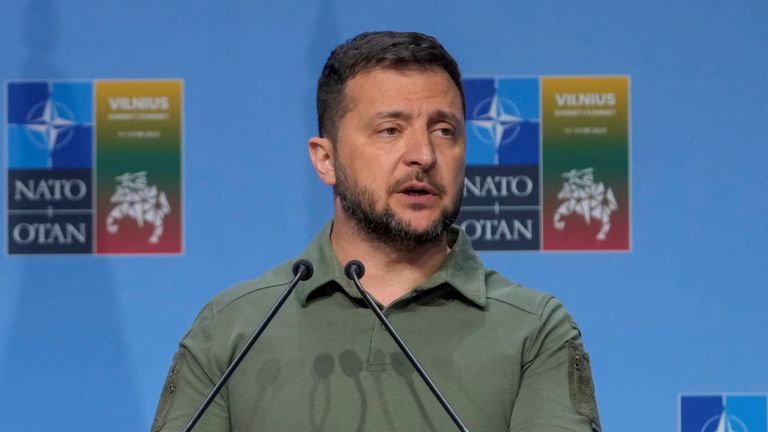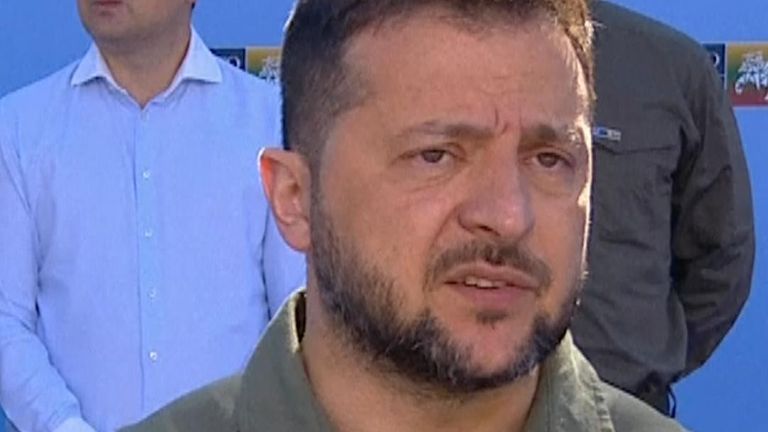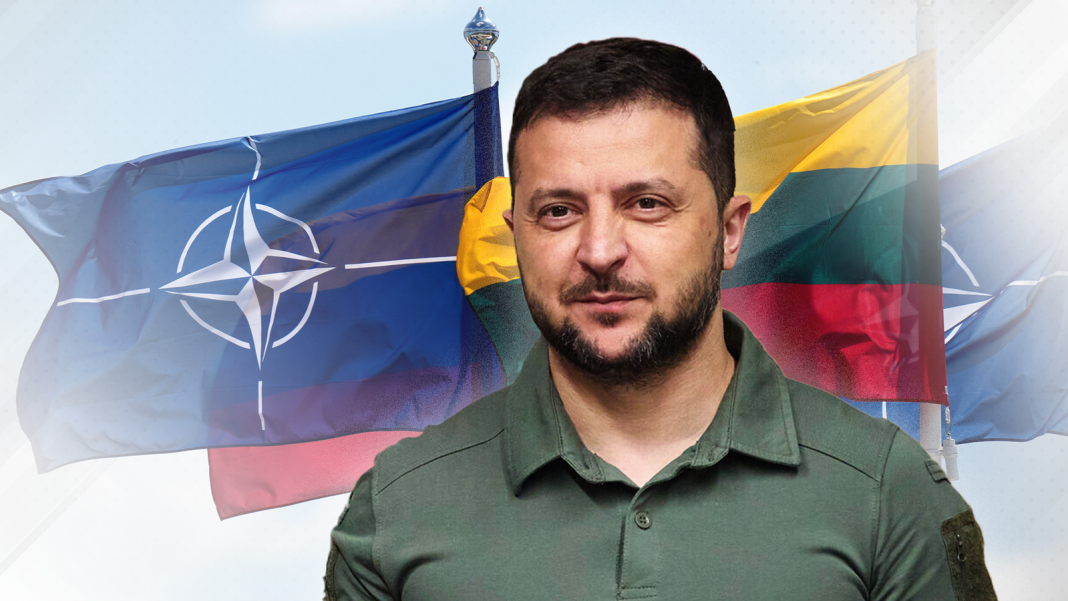NATO chief Jens Stoltenberg says the alliance will stand with Ukraine “for as long as it takes” as he suggested the country was now “equal” with existing members.
However, President Volodymyr Zelenskyy was clearly hoping that this week’s NATO summit in Vilnius would have resulted in some form of timeline and plan to chart Ukraine‘s accession to the NATO alliance.
Indeed, he described the absence of a clear roadmap as “absurd”.
Despite the announcement of additional aid and warm words, Mr Stoltenberg has instead said the alliance will issue an invitation to join “when allies agree and conditions are met”.
Why is NATO appearing so reluctant to bring Ukraine under its protective umbrella, and does this indecisiveness risk undermining Ukraine’s long-term security?
NATO is a defensive alliance and before any new nations can be considered for membership, they need to satisfy a wide range of membership criteria.
Specifically, NATO is a collective alliance and not a “defence subscription service”; all members must be able to make a meaningful military contribution to the collective and demonstrate clear capability and intent to provide military support to any member state in need.
Objectively, it is hard to see Ukraine meeting the membership requirements any time soon, and NATO will be reluctant to “bend the rules” too much for fear of setting a precedent.
But that should not – in itself – stop NATO from identifying a roadmap for Ukraine to join NATO at some stage in the future.
So why is NATO apparently dragging its feet?
Firstly, Mr Zelenskyy’s frustration with NATO exposes a deeper tension. His continual list of “demands” is creating challenges for NATO and Western governments, with Defence Secretary Ben Wallace advising “we are not Amazon”.
Please use Chrome browser for a more accessible video player
0:54
PM quizzed on Ukraine gratitude
In contrast, Mr Zelenskyy believes that Ukrainians are fighting Russia “on behalf of” the West. It is Ukrainian lives being lost so if anyone should be grateful it should be the West.
But away from the public rhetoric, international attention is increasingly turning to the post-war security environment for Ukraine.
Unless Ukraine or Russia “wins” and achieves its strategic objectives, the war will only culminate with a negotiated agreement.
Read more:
Johnson calls for NATO timetable for Ukraine to join alliance
Ukraine conducts ‘special operation’ using speed boats and drones
Both sides will want to ensure their own security concerns can be satisfied before they will agree to pursue meaningful peace talks.
In 1994, Ukraine agreed to give up its nuclear weapons in return for absolute guarantees on its territorial integrity from all signatories – the Budapest Memo was signed by Russia (and the US, UK and Ukraine) but within 20 years Vladimir Putin invaded Crimea.
Please use Chrome browser for a more accessible video player

2:50
Have the allies done enough to show their support?
As a result, Ukraine will be deeply suspicious of any declarations or written commitments from Russia and will need more concrete proposals for a credible peace plan – which is why it is so actively courting NATO.
However, Russia’s security concerns also need to be placated if peace is to be secured, and the steady expansion of NATO in the past 30 years has undoubtedly troubled a paranoid Russia.
Ukraine-Russia war – live updates
Mr Putin does not want Ukraine to join NATO, and if that appeared to be a foregone conclusion, it might stiffen Russia’s resolve to prolong the war to stop Ukraine joining the alliance.
It would be harder for Mr Putin to declare victory for the Special Military Operation to his domestic audience if the outcome is NATO forces on his doorstep.
Please use Chrome browser for a more accessible video player

0:52
Zelenskyy speaks ahead of final day of NATO summit in Vilnius
There are several ways in which Ukraine’s near-term security might be assured, and many will be less provocative than a commitment from NATO while hostilities continue.
Bilateral or trilateral international agreements might enhance Ukraine’s security in the immediate post-war period, which might prove more palatable options for Mr Putin.
This content is provided by Spreaker, which may be using cookies and other technologies.
To show you this content, we need your permission to use cookies.
You can use the buttons below to amend your preferences to enable Spreaker cookies or to allow those cookies just once.
You can change your settings at any time via the Privacy Options.
Unfortunately we have been unable to verify if you have consented to Spreaker cookies.
To view this content you can use the button below to allow Spreaker cookies for this session only.
Click to subscribe to Ukraine War Diaries wherever you get your podcasts
Indeed, the recent G7 declaration of a multi-year security arrangement with Ukraine appears to be an initiative designed to create options, albeit that Mr Putin might seek an enduring commitment from Ukraine not to join NATO before agreeing terms.
Regardless, although Mr Zelenskyy is understandably frustrated at NATO’s apparent tardiness, grand statesmanship is at work.
NATO membership offers one option to guarantee Ukraine’s long-term post-war security but it is not the only option, and agreement around NATO membership might just prolong – and even escalate – the devastating war in Ukraine.







